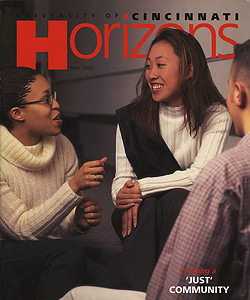by Mary Niehaus
War is never pretty. But when television reporter Gitana Lapinskaite covered reports of atrocities against women during the Bosnian War in the early 1990s, the news was so ugly that it changed her life. It raised questions she is learning to answer only now as she works on her master's degree in women's studies at UC.
The horror was not only in the murders, beatings, mutilations and torture of civilians. It was that soldiers from more than one side of the conflict felt justified in committing brutal sexual assaults and gang rapes of their ethnic hostages because of long-standing racial and religious hatred.
Lapinskaite, an anchor at the time for the Lithuanian State Television network and a contributor to "CNN World Report," says the Bosnian experience shook her. "That was the time when I got interested in women's problems and their status all over the world," she says. "Mass rape, establishment of the International Criminal Tribunal for former Yugoslavia, feminist interest in the laws of war and their effectiveness to prosecute rape as a war crime: This is my MA project."
Celebrating its 25th anniversary this academic year, the University of Cincinnati Center for Women's Studies has helped students understand the "why" of women's treatment as inferiors at various times and places throughout the world. Sometimes an "Aha!" experience about one's own relationship to the world is the result.
Lisa Hogeland, UC associate professor of English and comparative literature, tells of a student named Marcie. A "floundering" undergrad, the English major was only a mediocre writer and had little enthusiasm for her studies; an adviser told her that maybe she should forget about English. Then, everything changed. She graduated with honors and published her first book before entering graduate school. Today, she is finishing work on a doctorate.
When asked what had happened, Marcie explained that she had found a new sense of direction after taking a series of women's studies classes, says Hogeland, who is acting director of UC's women's studies program. It was women's studies that "oriented" Marcie.
Even Hogeland admits that as an undergraduate, she was profoundly influenced by a course in feminist literary criticism. "It was the first class in which I learned that you could study women writers -- and ideas about gender in women and men writers -- in a systematic, organized, rich and rigorous way. This idea was really new to me at the time and very exciting."

 Past Issues
Past Issues
